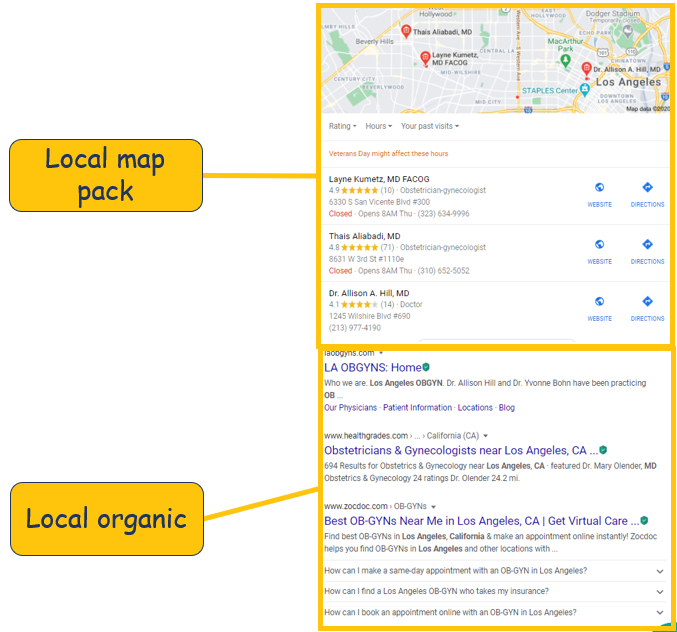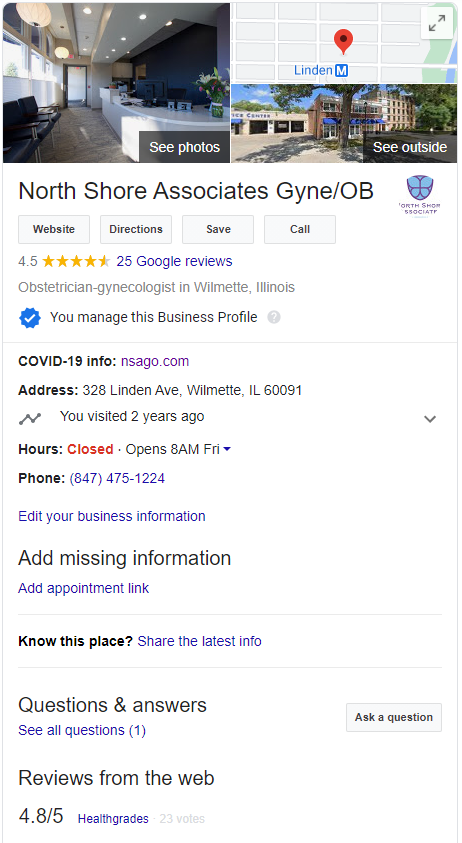Edited Video Transcript
This is NOT a tutorial about healthcare SEO! There are enough SEO geeks out there. This is about helping you choose a good outsourced SEO agency. Or, if you’re thinking about hiring somebody and bringing them into your practice, we want to give you just enough of a taste of healthcare SEO, so that when you make those choices, you can hopefully make better ones. It’s not easy to pick good people if you’re hiring for a position you’re not familiar with. You want them to be good ones. So we want to help you make a good decision.
This is All About Trust
SEO is a lot about knowing, liking and trusting someone. So before we even get into SEO, let’s talk about ourselves. In our own lives, we have people who we know like, and trust differently.
There’s Knowing Someone
 This is some guy that we just met. Maybe we remember his name, but that’s all we know. Do we like him? Don’t know. Do we trust him? No, we just met him.
This is some guy that we just met. Maybe we remember his name, but that’s all we know. Do we like him? Don’t know. Do we trust him? No, we just met him.
There’s Liking Someone
 This is a couple holding hands. So let’s hope that they at least like each other, right? Maybe they trust each other depending on how long they’ve been together.
This is a couple holding hands. So let’s hope that they at least like each other, right? Maybe they trust each other depending on how long they’ve been together.
And Then There’s Trust!
 The heart? That’s somebody we love. Hopefully we love them for good reasons and trust them deeply! If we’ve loved them for a long time, we’ve trusted them for a long time.
The heart? That’s somebody we love. Hopefully we love them for good reasons and trust them deeply! If we’ve loved them for a long time, we’ve trusted them for a long time.
No matter how you look at these three different types of people though it’s all about trust. It’s either there or it’s not. You can earn trust from people. You can lose people’s trust. You’ve got to keep it over time.
Healthcare SEO Is Earning and Keeping Google’s Trust
 Google is the same way. Each of the things that somebody does with us to earn our trust and keep it is like a signal – somebody keeps their word, they keep their promise, they do what they say they’re going to do. They’re loyal to you. They keep your secrets. Whatever they do, each one of those is a signal of trust. Google also needs signals of trust. Remember Google was built by people, who need signals of trust in their own lives. When Google delivers search results, those results at the top of the page are the ones that Google trusts more than those at the bottom.
Google is the same way. Each of the things that somebody does with us to earn our trust and keep it is like a signal – somebody keeps their word, they keep their promise, they do what they say they’re going to do. They’re loyal to you. They keep your secrets. Whatever they do, each one of those is a signal of trust. Google also needs signals of trust. Remember Google was built by people, who need signals of trust in their own lives. When Google delivers search results, those results at the top of the page are the ones that Google trusts more than those at the bottom.

Keep Sending Signals of Trust
How many signals does Google need? Send it one signal…meh…just getting to know you. “I don’t know if I should rank you. I just met you”, says Google. Send some more signals of trust. Okay, now I’m liking you a bit more. I’m certainly getting to know you better. And when I know you, I can like you. Nobody likes what they don’t know and nobody trusts what they don’t like. Send a lot of signals, and good quality signals, and a lot of them over time and Google says, wow, I really know you. I really understand you. It’s safe for me to rank you high. I won’t get burned by ranking you high. I think I will rank you high. It’s all about trust.
Healthcare SEO’s Goal – Climb Search Results
The name of the game of doing all this work is search results. In this world, there are two types of search results.
- Local Map Pack – which you see at the top, it’s called a pack because there’s three of them. And each one of these little rectangles here is one of those listings and there’s map because there’s a map above it.
- Local Organic – Just beneath those is something called the local organic results. For every search a different set of search results is going to pop up. There’s billions of searches a day worldwide. If you are a local practice, you obviously don’t care about what’s going on worldwide. You care about what’s going on in your world. Whatever search results show up in your world, those are the ones that you care about.

What Signals To Start with For Healthcare SEO
Now, there are a lot of signals that Google looks at. We’re going to look at four of them. Why are there four and why these four? Think of a collective brain trust of a bunch of super duper smart SEO geeks that run their own think tanks. They study Google a lot and they try to discern what Google cares about more than other things
The reason that we’re picking these four is because for the world of local healthcare SEO, these four account for well over 50% of all of the categories of signals that Google is looking for. So whatever it is you’re going to do, whoever you’re going to hire or outsource to, if they don’t have these four types of signals under control, nothing else is really going to matter.
Here they are:
- Make your website stronger by optimizing it.
- Get other websites to endorse you. Get backlinks.
- Google My Business. Claim and optimize your listing.
- Get your patients to praise you – getting reviews online.
Each one of these signals, by the way, has its own Healthcare Marketing Rx video.
Optimize Your Website
![]() Make your website stronger by optimizing it. These are some of the terms that you should hear a marketing agency say, or a possible new hire say, when they talk to you.
Make your website stronger by optimizing it. These are some of the terms that you should hear a marketing agency say, or a possible new hire say, when they talk to you.
Keyword Research
One of the first things they should do is keyword research. A keyword is anything that somebody types into Google’s search bar when they go to google.com. Whether it’s one word or a hundred words, that’s keyword. And they want to find keywords that are relevant to you.
Pages on your Website
A healthcare practice’s website must have certain pages. Does every provider have their own bio page. Does every service have its own service page? What about the about page? The contact page? There are others, but these are some core pages that they really ought to be looked at and they ought to be talking to you about if you don’t have them already
Technical Website Stuff
Here are a few of the more important areas to listen for or look for in proposals you’ll get.
- Images – are they contextual? Do they make sense for the page that they’re on? Do they load fast? Is there good alt text? Does the file name represent the keyword?
- Will your site be mobile friendly?
- Will your site be secure?
- Are there internal links? Internal links help Google read your website and understand what it is you’re doing.
- And finally a boatload of technical stuff. We’re not going to go into this. However, here are two words that you can listen for meta-tags and title tags. They matter. They’re important if you don’t see them, if you don’t hear them, uh, kind of a red flag there.
Backlinks
![]() A backlink is a way to get other websites to endorse you. What does that mean? Let’s imagine you your website’s address is www.website.com. There’s a company you’d love to endorse your website on their website. The one thing you need to know about the endorsing website is that Google thinks more highly of it than it does yours. Whether it’s just a little more or a lot more is less concerning. It can even be on par with yours. Just don’t get an endorsement from a website Google thinks less of than yours. Sounds just like real life. If you wanted somebody to say something nice about you to somebody else you’d want that person to be respected, right? At least as respected in you as you preferably more.
A backlink is a way to get other websites to endorse you. What does that mean? Let’s imagine you your website’s address is www.website.com. There’s a company you’d love to endorse your website on their website. The one thing you need to know about the endorsing website is that Google thinks more highly of it than it does yours. Whether it’s just a little more or a lot more is less concerning. It can even be on par with yours. Just don’t get an endorsement from a website Google thinks less of than yours. Sounds just like real life. If you wanted somebody to say something nice about you to somebody else you’d want that person to be respected, right? At least as respected in you as you preferably more.
Google has a way of gauging this. There are third parties out there that create scores.
The most popular term is “domain authority”. There are others, but nevertheless, you want the domain authority to be at least as good as yours and preferably a little bit higher than yours. A backlink is when the endorsing website, somewhere on their website that’s relevant to what you do, puts your address www.website.com on their site with a link so that anybody who clicks on that link will come back to your website. There’s the backlink.

You can have one backlink. You can have a hundred or a thousand backlinks, as long as they’re relevant. Now Google sees your website and goes, wow! This website that we respect must trust www.website.com because they put a link on it. They wouldn’t do that if they didn’t trust it, so it must be pretty good. I’m going to trust it more and rank it higher in search results.
Google My Business

This is an example of what a Google my business listing looks like. The reason that Google likes Google My Business so much is because you can pack a lot of information into a listing, all of which Google can read. It really helps Google understand who you are and what you do.
After you claim your listing, here is some of the information can and should put into your listing:
- your category. There are a lot that just don’t have good categories
- your address
- your phone number
- your hours
- People like pictures. Google likes pictures too, especially if you name them properly, optimize them properly, make them thin and easy to load, etc etc.
- Reviews
- a description
- posts ways to keep it fresh
Make sure you tell Google everything it’s asking you about your business, because Google is going to use all of that information to your advantage. When we start working with a practice as a client we almost always find their Google My Business listing with blank spaces where Google asks for information. Give Google what it’s asking for!
Patient Reviews
![]() Lastly, get your patients to praise you. Get more reviews. Google believes that practices with reviews are trustworthy. If they weren’t, why would patients give it positive reviews? As you think about implementing a reviews program for your practice with an outside agency or delegating to a staff member, keep these points in mind.
Lastly, get your patients to praise you. Get more reviews. Google believes that practices with reviews are trustworthy. If they weren’t, why would patients give it positive reviews? As you think about implementing a reviews program for your practice with an outside agency or delegating to a staff member, keep these points in mind.
You Have to Ask for Reviews
Is an asking procedure in place?
One in a million patients are going to leave you a review on their own. The rest have to be asked. You want to show reviews on Google, on Facebook, Healthgrades, Yelp, whatever they are. You want those reviews on those sites because that’s where lots of people go to hunt down a new health care practice to see if they want to call them and use them.
Will we show reviews on our website?
Sometimes people go straight to your website when they’re referred by somebody else. Preferably the same reviews that people are leaving on Google and Facebook and Yelp and those other sites. The best case scenario is that you ask somebody to leave a review on say Google. And then the system that you use automatically streams that review also to your website. That’s the best of all worlds. All you have to do is ask that patient to leave a review. Once they leave it on Google, then it shows on the website also. So you only have to ask once and you get it to two places. The patient only has to leave a review in one place and it shows in two places, it’s easier on everybody. Not all systems do that. If you get serious about reviews, if you’re not already, that is and you, and you want to, and you’re looking around for a third-party system to help you look for that feature.
Are our reviews Easy to Read?
Every once in a while, you’ll see on a website these beautiful, amazing, detailed stories from patients whose lives have been changed because of the practice and the doctors. The problem with those really lengthy reviews is that sadly, very few people read them. They don’t have any attention span. They want stars, a date, and a sentence or two.
They want easy to read and get the point across.
Are we getting reviews in a HIPAA compliant way?
If you’re going to get reviews using any kind of automation or you’re going to send out emails or texts, those email addresses and cell phone numbers count as protected health information. So if you’re using a third-party provider, make sure that they’re HIPAA compliant, very few medical practices or healthcare practices think about where HIPAA and marketing can overlap. There are places where they do and this is one of them. So just make sure that if you’re going to subcontract this out, that that subcontractor is HIPAA compliant. We offer an online patient reviews management system. For more information on this, check our Healthcare Marketing Rx, Are you Getting HIPAA Compliant Online Reviews?
What Makes a Good Marketing Agency for Healthcare SEO?
First, focus on how they get started with you. Even before you decide if you want to use them, they should want to do an evaluation of your online presence that includes these four signals. They can include whatever else they want, but if they don’t include these four signals, they’re not going to get very far because like we said above, these four signals are easily more than half of the reason why a website ranks on Google.
Their proposal for work should include:
- Which signals are strong and which are weak
- The priority in which they’ll turn each weak signal into a strong signal
- How they’ll keep the strong signals strong
- How they’ll measure each signal
- They’ll give you examples of prior work
- They’ll demonstrate that they’re HIPAA compliant
There’s more for sure that you want to look for, but when it comes to healthcare SEO, these are the things that we believe you really want to look for. MarketVisory Group offers a Healthcare SEO marketing plan and we make sure we include each of these 4 pillars.
Thanks for spending your time with this video. Our library of Healthcare Marketing Rx videos continues to grow! If you have questions about anything here, please contact us.
